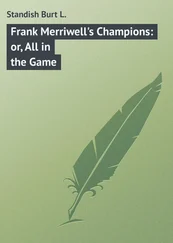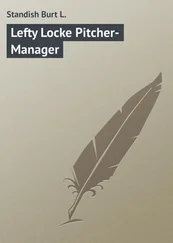Burt Standish - Frank Merriwell's New Comedian - or, The Rise of a Star
Здесь есть возможность читать онлайн «Burt Standish - Frank Merriwell's New Comedian - or, The Rise of a Star» — ознакомительный отрывок электронной книги совершенно бесплатно, а после прочтения отрывка купить полную версию. В некоторых случаях можно слушать аудио, скачать через торрент в формате fb2 и присутствует краткое содержание. Издательство: Иностранный паблик, Жанр: Прочие приключения, foreign_prose, на английском языке. Описание произведения, (предисловие) а так же отзывы посетителей доступны на портале библиотеки ЛибКат.
- Название:Frank Merriwell's New Comedian: or, The Rise of a Star
- Автор:
- Издательство:Иностранный паблик
- Жанр:
- Год:неизвестен
- ISBN:нет данных
- Рейтинг книги:5 / 5. Голосов: 1
-
Избранное:Добавить в избранное
- Отзывы:
-
Ваша оценка:
- 100
- 1
- 2
- 3
- 4
- 5
Frank Merriwell's New Comedian: or, The Rise of a Star: краткое содержание, описание и аннотация
Предлагаем к чтению аннотацию, описание, краткое содержание или предисловие (зависит от того, что написал сам автор книги «Frank Merriwell's New Comedian: or, The Rise of a Star»). Если вы не нашли необходимую информацию о книге — напишите в комментариях, мы постараемся отыскать её.
Frank Merriwell's New Comedian: or, The Rise of a Star — читать онлайн ознакомительный отрывок
Ниже представлен текст книги, разбитый по страницам. Система сохранения места последней прочитанной страницы, позволяет с удобством читать онлайн бесплатно книгу «Frank Merriwell's New Comedian: or, The Rise of a Star», без необходимости каждый раз заново искать на чём Вы остановились. Поставьте закладку, и сможете в любой момент перейти на страницу, на которой закончили чтение.
Интервал:
Закладка:
Burt L. Standish
Frank Merriwell's New Comedian; Or, The Rise of a Star
CHAPTER I. – “NEVER SAY DIE!”
It is not a pleasant experience to wake up on a beautiful morning to the realization that one has failed. There seems a relentless irony in nature herself that the day that dawns on a night when our glittering hopes have become dead, dull ashes of despair and ruin should be bright and warm with the sun’s genial rays.
So Frank Merriwell felt this fine morning in Puelbo, Colorado. The night before, with high hopes, he had produced his new play, “For Old Eli.” He recalled the events of that first production with almost a shudder. “For Old Eli” had been a failure, a flat, appalling, stupefying failure. From the rise of the curtain everything and everybody had gone wrong; lines were forgotten, Ephraim Gallup had had stage fright, his own best situations had been marred.
How much of this was due to the lying handbills which had been scattered broadcast, asserting that he was not the real Frank Merriwell, but an impostor, a deadbeat and a thorough scoundrel, Frank could not tell. He believed that these efforts to ruin him had little effect, for when, at the close of the performance, he had made a speech from the stage, assuring the audience that he would bring his play back and give a satisfactory performance, his reception had been cordial.
But the play had failed. Parker Folansbee, his backer, had acted queerly, and Frank knew that, after the company had reached Denver, the relations between him and his backer would cease. “For Old Eli” had been well-nigh ruinous, and when they got back to Denver, Merry and his friends would be without funds.
Then the thought came to him of the prejudice expressed against a poor black cat he had allowed to travel with the company. He could not restrain a smile as he perceived that the superstitious members of the company would feel that the cat had hoodooed them. As if a cat could affect the fortunes of men!
The thought of the cat gave a pleasant turn to his reflections, and he cheered up immensely.
He had failed?
No!
He would not acknowledge failure, defeat, disaster. He would not lie down and abandon the struggle, for he was not built of such weak material.
Where was the fault? Was it in the piece, or in the way it had been played?
He realized that, although the piece was well constructed, it was not of a high, artistic character, such as must appeal by pure literary merit to the best class of theater patrons.
It could not be ranked with the best productions of Pinero, Jones, Howard, Thomas, or even Clyde Fitch. He had not written it with the hope of reaching such a level. His aim had been to make a “popular” piece, such as would appeal to the masses.
He fell to thinking over what had happened, and trying to understand the cause of it all. He did not lay the blame entirely on the actors.
It was not long before he decided that something about his play had led the spectators to expect more than they had received.
What was it they had expected?
While he was thinking of this alone in his room at the hotel, Bart Hodge, his old friend and a member of his company, came in. Hodge looked disgruntled, disappointed, disgusted. He sat down on the bed without speaking.
“Hello, old man,” said Frank, cheerfully. “What’s the matter with your face? It would sour new milk.”
“And you ought to have a face that would sour honey!” growled Bart. “I should if I were in your place.”
“What’s the use? That wouldn’t improve things.”
“If I were in your place, I’d take a gun and go forth and kill a few stiffs.”
“I always supposed a ‘stiff’ was dead. Didn’t know one could be killed over again.”
“Oh, you can joke if you want to, but I don’t see how you can feel like joking now. Anybody else would swear.”
“And that would be foolish.”
“Perhaps so; but you know, as well as I do, that your play was murdered and mangled last night.”
“That’s so, b’gosh!” drawled a doleful voice, and Ephraim Gallup, another of the company, Frank’s boy friend from Vermont, came stalking into the room, looking quite as disgusted and dejected as Hodge. “An’ I’m one of the murderers!”
Frank looked Ephraim over and burst out laughing.
“Why,” he cried, “your face is so long that you’ll be hitting your toes against your chin when you walk, if you’re not careful.”
“Whut I need is somebuddy to hit their toes against my pants jest where I set down, an’ do it real hard,” said Ephraim. “I wisht I’d stayed to hum on the farm when I went back there and giv up the idee that I was an actor. I kin dig ’taters an’ saw wood a darn sight better’n I kin act!”
“You’re all right, Ephraim,” assured Merry. “You had to fill that part in a hurry, and you were not sure on your lines. That worried you and broke you up. If you had been sure of your lines, so that you would have felt easy, I don’t think there would have been any trouble as far as you were concerned.”
“I dunno abaout that. I never felt so gosh-darn scat as I did larst night. Why, I jest shook all over, an’ one spell I didn’t think my laigs’d hold me up till I got off ther stage. It was awful!”
“You had an attack of stage fright. They say all great actors have it once in their lives.”
“Waal, I never want to feel that air way ag’in! An’ I spoilt that scene in the dressin’ room of the clubhaouse. Oh, jeewhillikins! I’m goin’ aout of the show business, Frank, an’ git a job paoundin’ sand. It don’t take no brains to do that.”
“Cheer up! You are going to play that same part in this play, and you’ll play it well, too.”
“Whut? Then be yeou goin’ to keep right on with the play?” asked the Vermonter, in astonishment.
“No,” said Merry, “I am not going to keep right on with it. I am going to put it into shape to win, and then I’m going out with it again. My motto is, ‘Never say die.’ You heard what I told the audience last night. I promised them that I would play in this town and would make a success. I shall keep that promise.”
Hodge shook his head.
“You are smart, Frank, but there’s a limit. I’m afraid your luck has turned. You are hoodooed.”
Just then a coal-black cat came out from under the bed and walked across the room.
“And I suppose you think this is my hoodoo?” smiled Merry, as the cat came over and rubbed against his leg. “That’s where you are away off. This cat is my mascot, and she shall travel with me till the piece wins. She has stuck to me close enough since she walked onto the stage where we were rehearsing in Denver.”
“The cat is not the hoodoo,” said Bart, shaking his head. “I know what is.”
“You do?”
“Sure.”
“Name it.”
“I am!”
“You?”
“Yes.”
Frank stared at Bart in surprise, and then burst out laughing.
“Well, how in the world did you happen to get such a foolish notion into your head?” he cried.
“It’s not foolish,” declared Bart, stubbornly. “It’s straight, I know it, and you can’t make me think differently.”
Frank rose and walked over to Hodge, putting a hand on his shoulder.
“Now you are talking silly, old man,” he said. “You never were bad luck to me in the past; why should you be now. You’re blue. You are down in the mouth and your head is filled with ridiculous fancies. Things would have happened just as they have if you had not joined the company.”
“I don’t believe it.”
“You always were superstitious, but I believe you are worse than ever now. You have been playing poker too much. That’s what ails you. The game makes every man superstitious. He may not believe in luck at the beginning, but he will after he has stuck to that game a while. He will see all the odd things that happen with cards, and the conviction that there is such a thing as luck must grow upon him. He will become whimsical and full of notions. That’s what’s the matter with you, Hodge. Forget it, forget it!”
Читать дальшеИнтервал:
Закладка:
Похожие книги на «Frank Merriwell's New Comedian: or, The Rise of a Star»
Представляем Вашему вниманию похожие книги на «Frank Merriwell's New Comedian: or, The Rise of a Star» списком для выбора. Мы отобрали схожую по названию и смыслу литературу в надежде предоставить читателям больше вариантов отыскать новые, интересные, ещё непрочитанные произведения.
Обсуждение, отзывы о книге «Frank Merriwell's New Comedian: or, The Rise of a Star» и просто собственные мнения читателей. Оставьте ваши комментарии, напишите, что Вы думаете о произведении, его смысле или главных героях. Укажите что конкретно понравилось, а что нет, и почему Вы так считаете.












